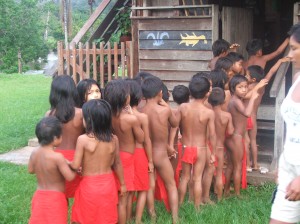Print  |
|


Mother-tongue based education in French Overseas Communities
Posted by Michel Launey on November 15, 2010

If we are to assume that every French should master the national language, we must ask what is the best means of access to it for non-Francophone children.
In Metropolitan France, this scenario only occurs with newcomer immigrants. In much of the French Overseas Departments and Territories, on the other hand, it relates to french children. All studies in psycholinguistics and educational sciences show that activities carried out in the mother tongue (L1), around referents known to children, are more effective than monolingual submersion in a language of schooling until then unkown to them. Far from hindering second language (L2) acquisition, such activities promote it, thus helping to build a balanced bilingualism which has positive repercussions on the overall learning process. The period of language development (up to 7 years) is crucial in this regard.
In the Overseas departements and territories, french school is faced with a linguistic-cultural context very different from its standards and its programs. Educational premises, nevertheless, often remain linguistically homogeneous : the presence of L1 (mother tongue) in school is therefore both necessary and relatively easy to implement. And indeed it is already in different ways, depending on parameters such as regional degree of autonomy, presence of mother tongue speaking teachers, linguistic and pedagogic upstream reflection on language issues :
– In Oceania (French Polynesia, New Caledonia, Wallis and Futuna), we find teachers giving from 5 to 7 hours of class in local languages.
– In French Guiana, around 40 assistans in mother tongue education (ILM) carry out activities in Amerindian languages, in Bushinenge (Maroon Creole language, with an English lexical basis), and in Hmong (spoken in 2 villages by populations originating from Laos), in places where these languages are spoken. Unfortunately, the absence of a stable status for the ILMs threatens the device, and even led to the dismissal of 9 of them (the most experienced!) in September 2009, the situation being corrected a year later.
– In Mayotte, we find a similar experience (in Shimaore and Kibushi) in only 3 schools. This time it is the open hostility of local education authorities which thwarts and threatens an experience that could prove to be extremely beneficial, if only teachers would receive support from their hierarchy and appropriate training.
– In creolophone Overseas Departments (French Antilles, Reunion, and the creolophone part of French Guiana) finally, this approach is less crucial : early bilingualism is indeed very common, and the lexical proximity of Creole and French gives it a different shape, with the result that the Regional Languages and Cultures system implemented in Metropolitan France may be more suitable. Where knowledge of French is inferior to that of Creole, some teachers resort to methods similar to those of the guyanese mother tongue assistants.
In conclusion, teaching regional languages as such (as practiced in Metropolitan France) is a legitimate program, but different from supporting existing bilingualism (as exemplified by many Creole people) and helping to build a balanced bilingualism for non-francophone children. Evaluations conducted in the Oceanic region confirm that including native languages in schooling is a pedagogically more fruitful approach than ignoring them.








